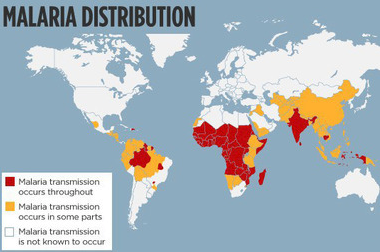Malaria is a disease spread predominately, but not exclusively, by night biting mosquitoes which inject a parasite into the body. Malaria is found in tropical areas of the world such as Africa, Central and South America and Asia.

According to the World Health Organisation (WHO) during 2017 1,800 people in the UK contracted malaria from travelling to high risk areas and six people died. Most cases are caused by the falciparum parasite which is found mainly in Africa.
Many of the cases are as a result of people not taking an anti-malarial tablets or taking the wrong antimalarial.You should always suggest that if your customer is travelling to a high risk country they should seek travel advice from the pharmacist or GP and customers who originate from countries where malaria is endemic should not assume that they have immunity acquired to malaria as it is relatively short lived.
If your customer is travelling to countries other than those in Europe or other western countries they should seek advice on whether they need anti-malarial tablets which can help to reduce the risk of infection if they are bitten.
Anti-malarial treatments are commonly obtained through private prescription or OTC.
Symptoms of Malaria
The most common early symptoms associated with malaria are flu like symptoms including a high temperature of 38°C or above, sweats, chills and vomiting.
Symptoms can lie dormant for up to a year depending on the type of infecting parasite. Anyone falling ill within one year of travel to a high risk country should see their GP, especially if they are ill within the first three months.
Other symptoms can include muscle pain, generally feeling unwell, diarrhoea, headaches and a cough.
